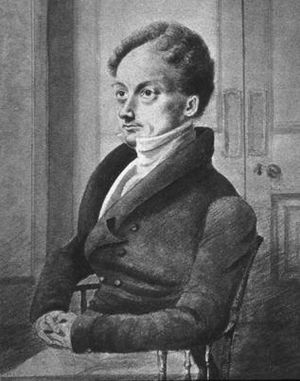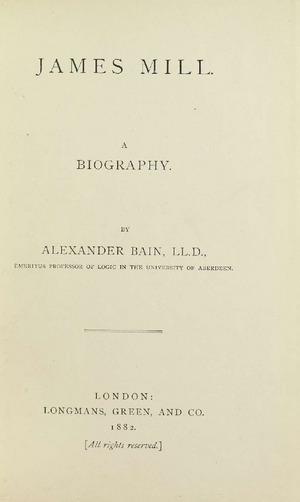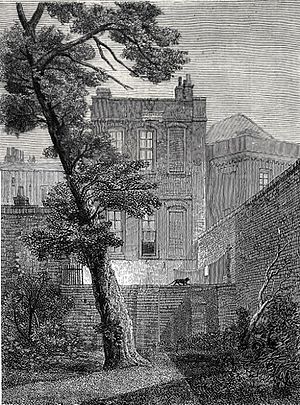James Mill facts for kids
Quick facts for kids
James Mill
|
|
|---|---|
 |
|
| Born |
James Milne
6 April 1773 Northwater Bridge, parish of Logie Pert, Angus, Scotland
|
| Died | 23 June 1836 (aged 63) Kensington, London, England
|
| Alma mater | University of Edinburgh |
|
Notable work
|
The History of British India (1817) |
| Spouse(s) | Harriet Burrow |
| Era | Modern philosophy
|
| Region | Western philosophy
|
| School | Associationism Utilitarianism Liberalism Ricardian economics |
|
Main interests
|
Psychology Ethics Economics |
James Mill (born James Milne; 6 April 1773 – 23 June 1836) was an important Scottish thinker. He was a historian, an economist, and a philosopher. He helped create the Ricardian school of economics.
Mill also wrote a famous book called The History of British India in 1817. He was one of the first historians to look at India from a colonial point of view. He divided Indian history into three main parts: Hindu, Muslim, and British. This way of looking at history became very popular.
James Mill was the father of John Stuart Mill. John Stuart Mill also became a famous philosopher. He was known for his ideas on liberalism and utilitarianism.
James Mill's Early Life and Education
James Mill, originally named James Milne, was born on April 6, 1773. His birthplace was Northwater Bridge in Scotland. His father was a shoemaker and a small farmer.
His mother, Isabel Fenton, wanted him to have the best education. She sent him to the local parish school. After that, he went to Montrose Academy. He stayed there until he was seventeen and a half years old.
In 1789, he started studying at the University of Edinburgh. He was very good at learning Ancient Greek.
Moving to London and Starting a Career
James Mill first trained to be a minister in the Church of Scotland. However, he did not find much success in that path. From 1790 to 1802, he worked as a tutor. During this time, he also studied history and philosophy.
In 1802, he moved to London with Sir John Stuart. Sir John Stuart was a member of parliament. In London, James Mill focused on his writing career.
From 1803 to 1806, he edited a magazine called the Literary Journal. This magazine aimed to cover all major areas of human knowledge. He also edited another newspaper, the St James's Chronicle.
In 1804, he wrote about the corn trade. He argued against taxes on grain exports. In 1805, he published a translation of a book about the Protestant Reformation. Around this time, he began working on The History of British India. He thought it would take him three or four years, but it took twelve!
Family Life and Important Friendships
In 1805, James Mill married Harriet Burrow. Her mother ran a place for people with mental health challenges in Hoxton. Their first son, John Stuart Mill, was born in 1806 in Pentonville.
In 1808, James Mill met Jeremy Bentham. Bentham was 25 years older and became his close friend. Mill fully adopted Bentham's ideas. He decided to use all his energy to share these ideas with the world.
Mill wrote for several magazines between 1806 and 1818. These included the Edinburgh Review and the Annual Review. He wrote about money, trade, and the British East India Company. In 1811, he worked on a magazine called the Philanthropist. He wrote many articles about education, freedom of the press, and prison reform. He also helped discussions that led to the founding of the University of London in 1825.
In 1814, he wrote articles for the Encyclopædia Britannica. These articles explained utilitarianism. Important topics included "Jurisprudence" (the study of law) and "Government."
Success and Later Career
The History of British India was published in 1818. It was a huge success. This book changed Mill's life. The next year, he got a job at India House. This was an important office that handled letters about India.
He moved up in his job. By 1830, he was the head of the office. His salary was £1900, which was a lot of money back then. His major book on economics, Elements of Political Economy, came out in 1821.
From 1824 to 1826, Mill wrote for the Westminster Review. This magazine was for the Radical political party. He criticized other magazines and the church. In 1829, his book Analysis of the Phenomena of the Human Mind was published.
From 1831 to 1833, Mill defended the East India Company. This was when its special trading rights were being discussed. He was the official spokesperson for the company's directors. His last book was Fragment on Mackintosh (1835).
James Mill's Important Ideas
His Book: The History of British India
James Mill supported British rule over India. He believed it was Britain's job to "civilize" India. He thought his work for the East India Company would help improve Indian society. Mill described Indian society as not very advanced. He argued that Indians had never reached a "high state of civilisation."
Mill preferred to study social topics using theories, not just facts. His most famous book is History of British India. It describes how England took control of the Indian Empire. In the book, he said Indian society was "barbaric." He also claimed that Indians could not govern themselves. He criticized how Britain conquered and managed India.
Mill never actually visited India. He wrote his book using only documents and records. Because of this, some people, like economist Amartya Sen, have strongly criticized his work.
Historian Thomas Trautmann said that Mill's book was a major source of negative views about India. Mill wrote that Indians were often dishonest and unfeeling. He said both Hindus and Muslims shared these traits. He also claimed Hindus were like "eunuchs" and "excelled in the qualities of a slave." He said they were "disgustingly unclean."
Later, Max Müller disagreed with Mill's ideas. He said it was wrong to think Indians were an "inferior race." He believed such views caused problems for Englishmen living in India. Müller thought Mill's book was "responsible for some of the greatest misfortunes" in India.
Influence on British Politics and Economics
James Mill played a big role in British politics. He was a key figure in a group called "philosophic radicalism." His writings on government and his influence on politicians helped change political thinking. People started focusing on how to get good government. They wanted to expand who could vote. This idea helped lead to the Reform Bill.
His book Elements of Political Economy built on the ideas of his friend David Ricardo. By 1911, the Encyclopædia Britannica said this book was mostly important for history. It summarized ideas that were no longer widely accepted. Some of his main ideas in economics included:
- The main problem for reformers is to control population growth. This is because capital (money and resources) does not grow as fast as people.
- The value of something depends on how much work was put into making it.
- Any "unearned increment" (money gained without effort, like from land value increasing) should be taxed.
Contributions to Psychology and Ethics
Through his books Analysis of the Phenomena of the Human Mind and Fragment on Mackintosh, Mill became important in the history of psychology and ethics. He studied how the mind works. He built on ideas from the Scottish Enlightenment.
He used the idea of "association." This means that complex feelings and thoughts are made up of simpler pleasant or painful sensations. He tried to define terms clearly and state his ideas simply. His work greatly influenced Franz Brentano.
His book Fragment on Mackintosh criticized another philosopher, Sir James Mackintosh. Mill discussed the basic ideas of ethics from his own utilitarian point of view. Utilitarianism is the idea that the best action is the one that brings the greatest good for the greatest number of people.
Major Works

- An essay of the impolicy of a bounty on the exportation of grain, 1804.
- Commerce Defended, 1808.
- The History of British India, 3 volumes, 1817.
- "Government", 1820, for Encyclopædia Britannica.
- Elements of Political Economy, 1821.
- "Liberty of the Press", 1825, for Encyclopædia Britannica.
- Essays on Government, Jurisprudence, Liberty of the Press, Education, and Prisons and Prison Discipline, 1823.
- Analysis of the Phenomena of the Human Mind, 2 volumes, 1829.
- Essay on the Ballot and Fragment on Mackintosh, 1830.
- The Principles of Toleration, 1837.
See also
 In Spanish: James Mill para niños
In Spanish: James Mill para niños
- Capitalism
- Free trade
- James Tod
- List of liberal theorists
 | Valerie Thomas |
 | Frederick McKinley Jones |
 | George Edward Alcorn Jr. |
 | Thomas Mensah |


